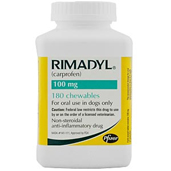Relieving pain does more than keep
your dog comfortable and happy; it can also help him heal and improve
his overall health. Research has shown that untreated pain delays
healing from injury and surgery, weakens the immune system, and has
other unwanted health effects unrelated to the disease that is causing
the discomfort.
"If your dog is still suffering despite the best efforts of your regular veterinarian, ask to be referred to a specialist in canine pain management."
Signs of Pain
Sometimes diagnosing pain is easy.
Dogs that have been recently injured, undergone surgery or diagnosed
with a disease that is known be painful (e.g., pancreatitis or intervertebral
disk disease) are hurting and should be treated accordingly. However,
dogs are very good at hiding their discomfort and "putting a good
face" on things, so chronic, mild to moderate pain often goes undiagnosed.
Signs of pain in dogs can include:
- Whining, crying out, howling
or other atypical vocalizations
- Limping
- Restlessness. A dog
may pace, circle, and lie down only to quickly get up and start moving
again
- Shying away or becoming
tense when approached or petted
- Snapping or biting
- Withdrawal from the family
or conversely, seeking more attention than normal
- Loss of appetite and/or
a reluctance to chew and swallow
- Unwillingness to move
- Reluctance to take deep
breaths and/or panting
- A grimace, sometimes with
drawn back ears, dilated pupils, and a vacant look in the eyes
- A hunched back
- Licking, biting or scratching
at a particular location on the body
- Loss of house training
- An unkempt coat
Veterinary Care for Pain Management

If you think your dog is in pain, take
him to the veterinarian. He may have an underlying condition that
needs to be diagnosed and treated, and doing so should also make him
more comfortable. Short term pain relief may be necessary while
the body heals. On the other hand, chronic conditions that can
be managed but not cured may require life-long treatment to relieve suffering.
Non-steroidal anti-inflammatory drugs(NSAIDs)
are the mainstay of treatment for mild to moderate pain in dogs.
Drugs like Rimadyl and Deramaxx are generally very safe and effective, but
if you notice vomiting, diarrhea, loss of appetite, or a darkening of
the feces, stop giving the medication and call your veterinarian immediately. Gastrointestinal problems, including ulcers, and liver and kidney disease
are possible with NSAID use in dogs.
Opioids are often reserved for treating
severe pain. An oral drug in this class, tramadol, is an exception and is frequently used instead
of or in conjunction with NSAIDs when an individual cannot tolerate
the latter's side effects or needs enhanced pain control. Other
types of drugs (e.g., gabapentin) may also help with severe, chronic
pain.
Drugs aren't the only treatment option,
however. Depending on your dog's condition, you might want to consider:
- Supplements like glucosamine, Adequan or Duralactin
- Physical therapy
- Massage
- Acupuncture/pressure
- Cold laser therapy
Treating Your Dog's Pain at Home

Some over the counter drugs such as
acetaminophen or aspirin can be used to treat pain in dogs, but they
are less effective and/or riskier to use than those that are available
with a veterinarian's prescription. Talk to your vet before giving
your dog any type of medication. If your dog has been prescribed
a pain reliever, make sure to closely follow the instructions written
on the label. Increasing the amount you give can be dangerous.
If your dog is still suffering despite
the best efforts of your regular veterinarian, ask to be referred to
a specialist in canine pain management.
The above is provided for information purposes only and should not be used for the diagnosis or treatment of any condition.
This information does not cover all possible variables, conditions, reactions, or risks relating to any topic, medication, or product and should not
be considered complete. Certain products or medications may have risks and you should always consult your local veterinarian concerning the treatment of
your pet. Any trademarks are the property of their respective owners.